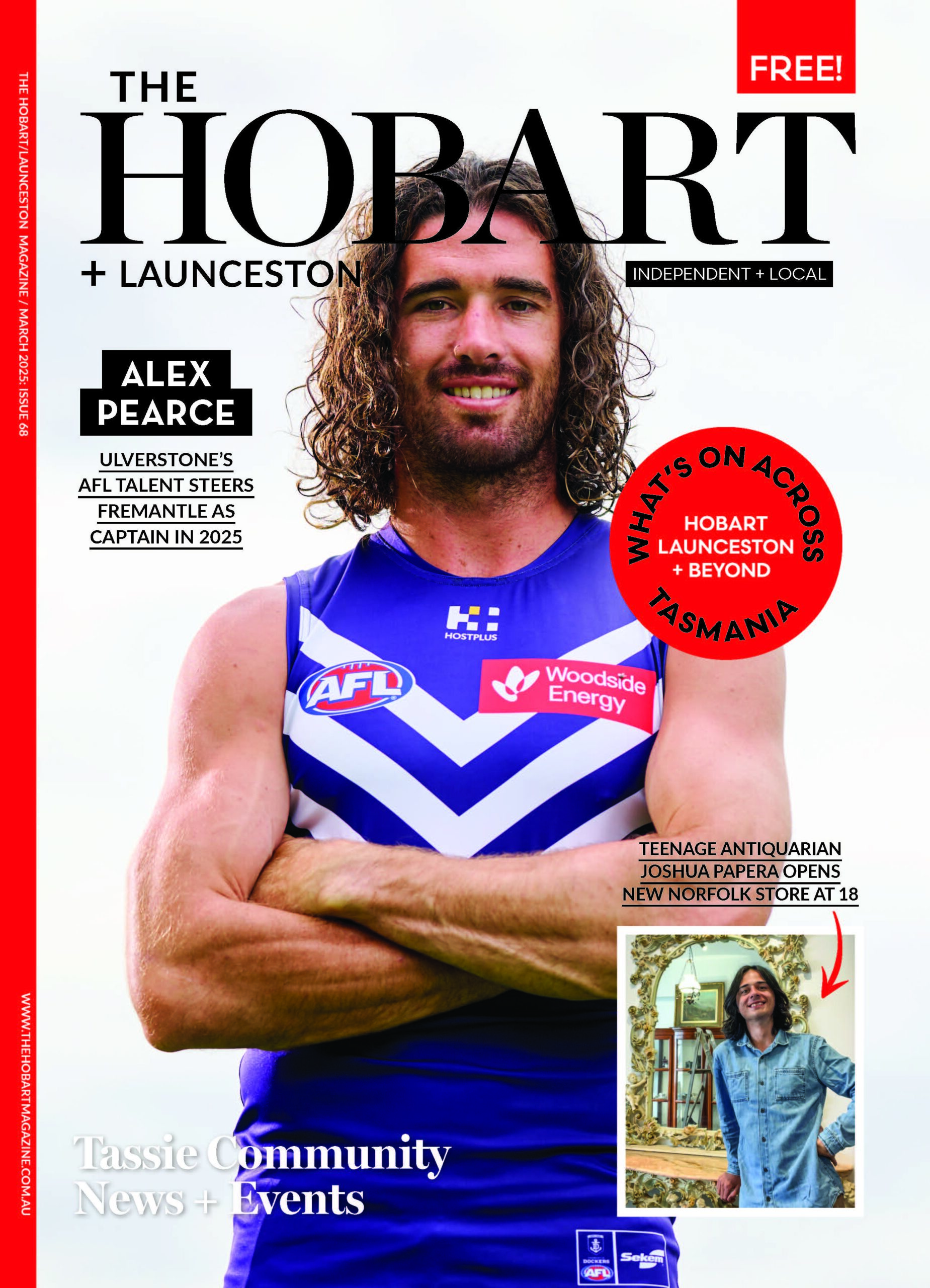OFF SEASON: Bert Spinks
by Stephanie Williams

Bert Spinks, aka Storyteller Spinks, is a Tasmanian poet, writer, bushwalking guide and storyteller who lives in a train carriage in the bush. Like many artists in Tasmania, Bert finds space and solace during the Off Season and considers it the perfect time to write.
Where did you grow up? I grew up in Beaconsfield. I have heaps of winter memories – playing footy on frosty grounds, walking to the bus stop in short shorts, getting home near the winter solstice when it was already close to dark. One of my favourite games, with my brother and a cousin, was to try and peel the largest segments of ice off puddles and our bird-baths – and then smash them into hundreds of pieces (sometimes on each other’s heads)! I feel like we inadvertently toughened ourselves up in those days.
Where is home now? I live in a little train carriage in a forest in northern Tassie. I don’t like to blab on about it too much because it shelters and supports some of my deepest dreams. But stays warm in winter with a little woodfire. It’s a great place to watch birds, and pademelons greet me every morning. One of my artistic practices is based in the carriage – the podcast In a Train Carriage, Going Nowhere – for which I set up a small field recorder and tell meandering stories, partly about life in the bush but also much about other far-reaching topics. It’s been a perfect space for writing over the past years.
What does the Off Season in Tasmania mean to you? Winter is the chance to move slower, turn inwards, eat richer food, drink darker beer and especially, for me, to write poems. For me, the shorter days and starry nights give a great opportunity to think deeply and dream a lot. Much of the contemplation that’s needed to be a writer comes from winter hours. I tend to be a beach person in winter, which may sound strange but probably has similarities to the traditional life of the first Tasmanians. Swimming in rivers and lakes is pretty gutsy in the winter months, but some of our salt-water swimming spots are perfect in winter. I also love to be in the midst of moss when it’s been wet – mosses are such interesting plants, so full of life and worthy of a closer look.
What is it about Tasmania – or Tasmanians – that leads to such rich stories coming out of the island? I have long held that there are stories in every square inch of Tassie! So much about our island is different, from geology to human history. It’s special to see how all the different elements relate with each other. I like bushwalking because it brings me in contact with more of the non-human world. Walking itself seems to stimulate my subconscious to come up with new stories and see new connections between ideas. I can’t imagine being creative without bushwalking.
Should some stories remain untold? I reckon most stories should be told, but it’s important to get the timing right. Tassie storytelling often is laconic, and I think many of the best yarns don’t like to be rushed. Again, this is one of winter’s potential lessons: take your time, don’t force too many issues, let your thoughts mature, always ponder as many view-points as you can and be considerate with whatever you’re up to.
What’s your advice for people who have a story to tell but don’t know where to start? For those who have stories to tell and aren’t sure where to start, it might be useful to try and whittle them down to a small piece. Sometimes we want to blurt out a lot – maybe it means we don’t feel very well listened-to, or we suddenly find that each passage in our life story leads to another. It takes a lot of willpower to craft a story into its crucial features. And hard work! I really love haiku poems: they can be a great way to reduce a story into the smallest possible parts. From there, of course, you might develop the story into any other genre.

What do you love about the Off Season? It can be a wonderful time to develop a passionate interest in some-thing. It’s a time to pick up a new skill or deep-dive into a subject. You might madly follow a football team or get into family history. I’ve spent a bit of time in Iceland, where winters are longer and much more severe: their storytelling heritage, which lives strong today, comes from winters yarning about the legends who lived before them. So winter is the time to perfect a story and think about history too, to put the events that have shaped your identity into words. It can also be a chance to step back from what’s expected of us (and what we expect of ourselves) and try a different rhythm. We can be fooled into thinking. The Tassie winter sometimes gives you little opportunity to do that. Sometimes there’s nothing to do but sit at the window and watch rain come pouring down. Or light a smoky fire in the backyard and sip stout till the stars come out.
For more information about Bert’s upcoming performances and work
visit facebook.com/storytellerspinks. Listen to Bert’s podcast In a Train Carriage, Going Nowhere on most podcast platforms or head on over to storytellerspinks.substack.com.

